TheTaverns of Tiefenthal
Developer: Wolfgang Warsch
Publisher: North Star Games
Format: Deck building, Dice drafting, Dice placement
Number of Players: 2 - 4
Play Time: 60 minutes
Price: $49.99
Copy Provided By Publisher
Running any kind of service business is a tough prospect. Even given beer’s reputation as a popular adult drink the world over, what’s a tavern owner have to do to stand out in a city full of competitive watering holes? And perhaps more importantly, when the board game hobby fills the metaphorical stein so full of strategy games that it’s sloshing over the brim, what’s yet another have to do to be seen above the crowd?
The Taverns of Tiefenthal comes to my gaming table courtesy of North Star Games, a company with a fair bit of clout behind its name.The Quacks of Quedlinburg and Evolution are both favorites that sit on my shelves, games I’ve enjoyed in no small measure for no small amount of time! But past laurels don’t necessarily indicate future prospects, especially when dabbling back into the oversaturated realm of engine building Eurogames. Between you and me, though, North Star’s done a little something to spike the formula, something that caught my eye almost immediately. They’ve added a pinch of dice drafting to this deck builder. Dice? And deckbuilding? In the same game?
If this works, it’s going to be one masterful brew, like adding chocolate to a stout. But is it ultimately tasty, or does it spoil the flavor with too many ingredients? Have a seat while I order us a few things.
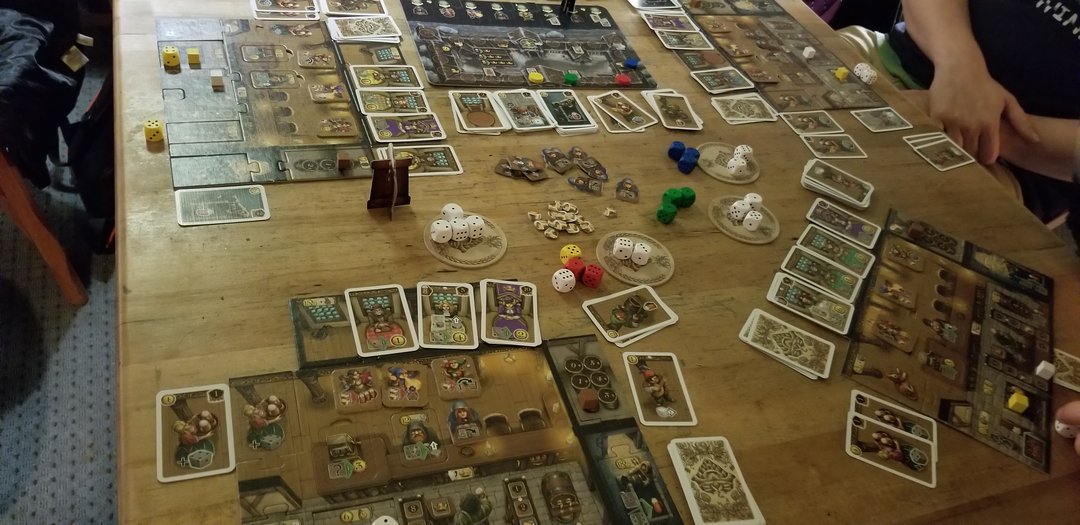
Four businesses lined up on the same road, vying for customers? This isn't madness. THIS. IS. TAVERNS.
A New Blend
I went into Taverns with what I’d call a healthy dose of skepticism. Goodness knows my sense of “how can this possibly be as good as it seems” has been wrong before (see literally any of my Button Shy spotlights). But still, the idea of combining cards and dice seemed pretty alien to me. A bold experiment. Of course since coming back from PAX Unplugged I’ve reviewed another game that plays with these ideas, the tiny Japanese trick taker, Nokosu Dice. So perhaps what Taverns was, no pun intended, bringing to the table wasn’t such a crazy idea after all.
In the base game, you take your standard deckbuilder approach of a starting stack of cards containing some so-so patrons, a valuable server, some extra furniture, and other hired help, and you try to turn a profit that will make your tavern more prosperous than everyone else’s. You’ll keep drawing from your deck each turn until you have a patron seated at each available table, slotting non-patron cards bonuses elsewhere if you draw them first, and then you participate in a brief round of dice drafting. The dice power the little engine on your player board, allowing you to serve patrons, produce more beer, grab money from your cash box, or advance a special bonus track with all sorts of goodies on it.
The game plays with two concurrent currencies: beer and money. Money is used to renovate your player board tavern and purchase improvement cards that go into your deck, beefing up your business. Beer is used to attract better and better patrons to your tavern (who also go in your deck), and if you can make enough of it you can even lure nobles to your establishment; of note, you also attract nobles every time you renovate a part of your board. Nobles are worth a ton of points and all sit together at the same table, which is both thematic commentary on their picky nature of not mingling as well as a mechanical bonus to your engine (remember that you only stop drawing once all your tables are full). In the base game, attracting nobles is your big source of end game points, so the faster you can ramp up beer production, as well as renovating your tavern, the more successful you’ll be!
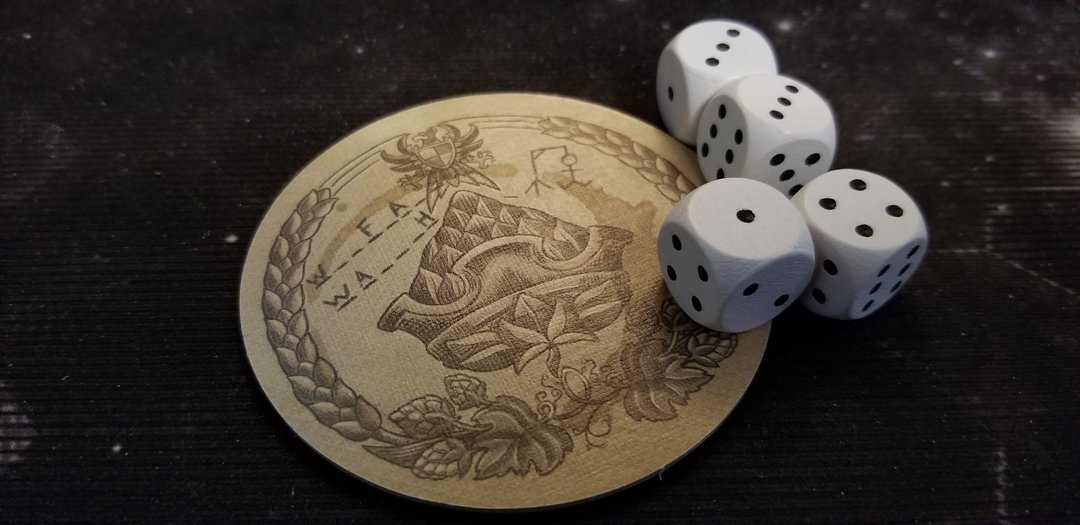
This isn't me being funny. The beer mat tiles you put your drafting dice on even look like someone wrote on them! The level of attention to detail here is really something!
So how good is this new house blend of dice and cards? I’m not going to make you wait until the end of this review to find out. No, we’ve got more things to talk about on our way through the menu! Actually I’d say this combo works pretty darn well. Dice placement determines what you can activate on your board each turn, and in classic board game fashion you never have enough to do everything all at once. But the dice you end up with, short of hate drafting or a particular number being rare and widely desired, are of your choosing. That sense of agency is a pleasant addition to the formula of randomness that comes with deckbuilders. In practice, the drafting round felt less like a bolted-on, mechanical addition and more like a purposeful planning opportunity. It’s that staff meeting you have 30 minutes before opening the doors, letting everyone know what you expect of them and giving a heads up to those on the front lines you’ll be working with more closely tonight. “You see that person working their way over to their usual table? Make sure they’ve always got a beer in their hands!”
So you prioritize and make the best of what your shuffled deck hands you. Maybe one turn your deck spits out a mob of low-value patrons you don’t particularly care about, but such turns can feel like freedom! The dice you draft could be used instead to activate some of the static spots on your board, moving you around the special bonus track towards something you really need. You could funnel all your resources this turn into beer to get one really good purchase off the market. Or maybe you quietly take the turn to build up your staff; any cards you buy go on top of your deck, not into your discard. Which means if you just drew tables full of low-spenders, you could set yourself up for what might be a really good follow-up turn, drawing all your upgrades and extra staff on top of the people you’ve been waiting to see! Being a cunning businessperson is just as much about timing and opportunity as it ever was.
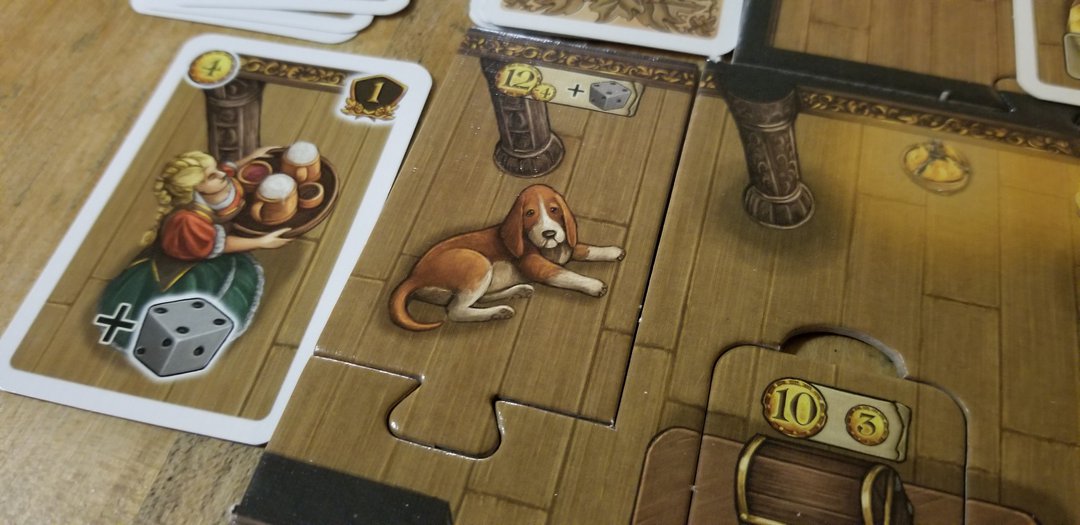
There's some debate amongst my group as to whether flipping this tile over for another server, moving the dog away, really constitutes an upgrade.
Modular Setup
If you’ve got a keen eye, you’ll notice I’ve said “base game” up to this point. That’s because Taverns comes with a whopping FOUR extra modules in the box! They build on each other, so you have to add them in their order at the back of the book. Each adds one or two new rules to the formula, and they are all awesome. The first module (titled “second” in the rules, as the book counts the base game as “the first” technically) introduces entertainers. The Dancer, Fire Breather, and Juggler all show up on different turns to give you even more agency over how you run your budding business. Each gives you a choice of two powers when they arrive, though they can never be changed once they start working for you, and the best part is they work for free! Sort of. The game adds a third “currency” in schnapps. You accrue this extra drink over the course of the game, and you’re allowed to spend as much of it as you’d like to activate your performers. Any extra schnapps tokens are worth extra points at game’s end, too.
Module two (or three per the book) adds reputation. The bar on your player board flips over to reveal an extra track, allowing you to obtain even more bonuses even faster! Assuming you can now juggle the extra consideration of producing beer and money in equal amounts. Is it worth it to you? Well, you can earn extra schnapps and nobles from the reputation track. You can also hire bards to help sing your praises and raise your rep even faster! “Toss a coin to your barkeep, oh valley of plenty…”
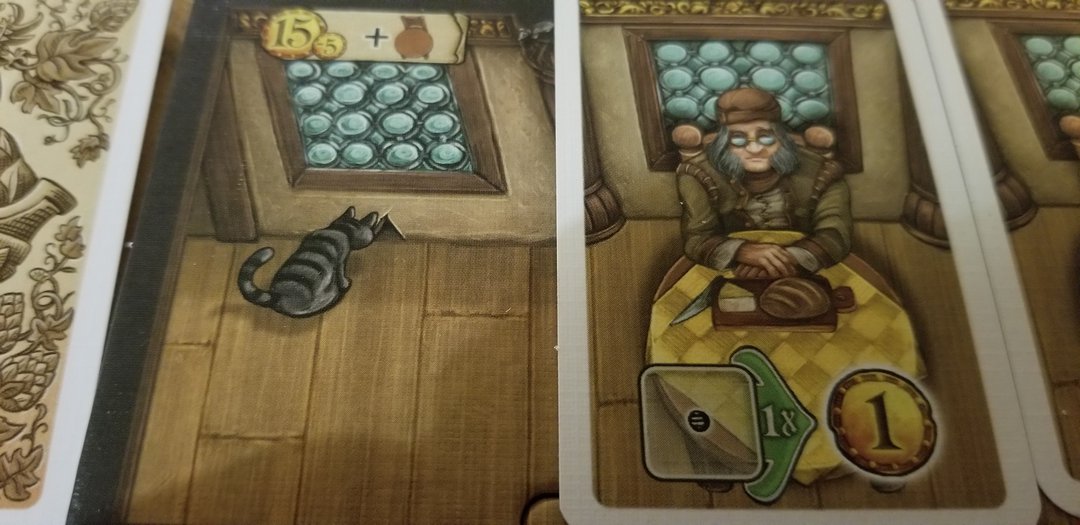
Likewise, while you may patch up this wall when you add an extra table, I'm wondering where our tavern cat got off to!
The module after that gives us New Beginnings. Literally, the players gain a choice of asymmetrical starting positions dealt out randomly from three cards of a possible seven, offering them new bonuses or slanted strategies to bank their businesses on. What’s interesting about this setup is that multiple players can choose the same option from those on display, allowing them to go completely different routes or one up each other. Or maybe all the players pick the same start, symmetrical still but all offset from the default style of play. Finally, in the last module we get a guestbook, a system that runs concurrently to purchasing patrons. Now you gain signature tokens to fill up your guest book when adding new patrons to your deck (reputation can also boost this), giving you yet more bonuses for filling rows and columns on the book’s grids. A nice little visual touch is that the tokens aren’t all just the same signature over and over again, giving a little flair to the already cozy feels this game provides.
These extra modules take what is a very stark base game and boost it into much greater heights. If I’m being completely honest, there’s nothing wrong with the base game by itself, but it’s a bit one dimensional. Get money, improve your engine, make more beer, get as many nobles as possible. It’s great for teaching the basic formula, or as a gateway game, but having played with the modules I would never go back to playing without them again. In my opinion the game needs extra options, and these modules provide that by the keg full. With each new module, the game gets even less conservative and much more engaging, offering you powerful new ways to play, throwing caution to the wind if you can just balance one more avenue for your business. One of the other big additions my friends enjoyed was the ability to remove cards from your deck; this is practically nonexistent in the base game, that classic element so common to other deckbuilders, but as soon as the Fire Breather shows up (and in later modules as well), you can begin trimming your cards. If slimming your deck down is more your style, considerations like this make the modules all the more welcome. We were certainly glad to have them.
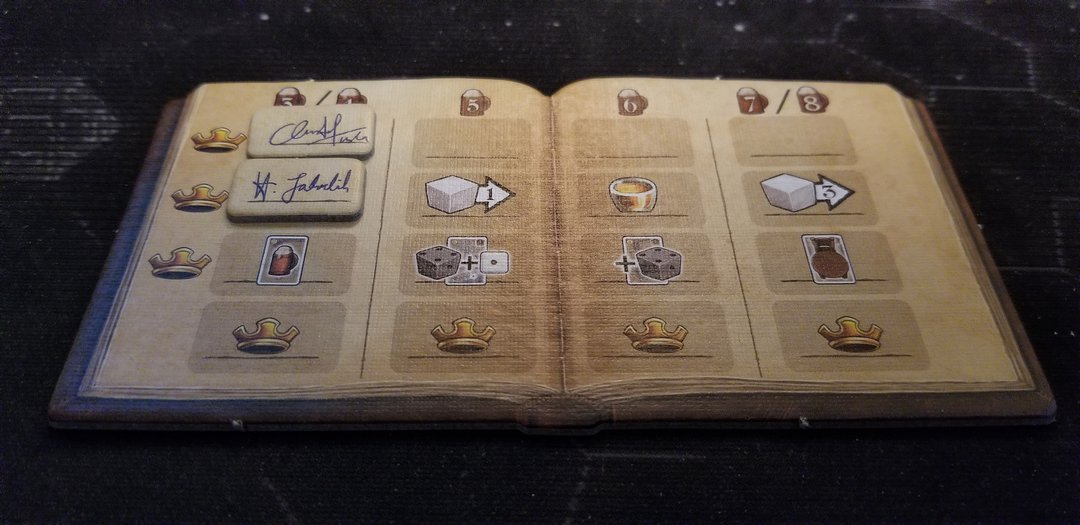
Sample guestbook and signature tokens. As ever, components feel thematic and come to life through attention to small details.
Order Me Another, Please
Does Taverns do enough to stand out on its own in a city of sparkling lights, each its own strategy game vying for your attention, hawking on the street for you to stop in just for a few minutes? In several ways, yes, I think it does. But maybe not for all the reasons you thought.
I’ll say this one up front and get it out of the way. Combining a light dice draft with a light deckbuilder is a solid move here. Both elements work well together to give you agency in systems that can be notorious for ignoring half your hard work and planning. When you fail in Taverns, you’ll want to blame those lazy employees for not showing up to work on time but realize it was your own bad foresight that got you into that mess in the first place. As you bolt in the extra modules, all the fun new ways you can earn points while making your tavern your own unique business ramp up that satisfaction we get from good engine builders: making a thing that’s your own and then watching it run. I’ll also say that without the modules and the dice drafting, I think the deckbuilding element alone in this game would be a little too light for my tastes and probably wouldn’t hold my interest for very long. Combined as everything is, the game hits a sweet spot of complexity and engagement without being overly muddied.
And I’ll say this for the look and feel of Taverns. North Star really nailed it! This could have been a pasted on theme (and yes, it’s still comical to think about how, say, the Fire Breather helps you renovate your place by proactively torching bits of it), but I genuinely think the theme here works well. Look at your tavern before it opens for business, all quiet and clean. Empty. Then look again when there are patrons at tables, servers bustling around with drinks as delivery folks wheel in kegs to your basement, the performers moving around the floor. The board takes on so much life! Credit where credit is due, Taverns feels cozy and inviting like the very thing you’re working so hard to build.
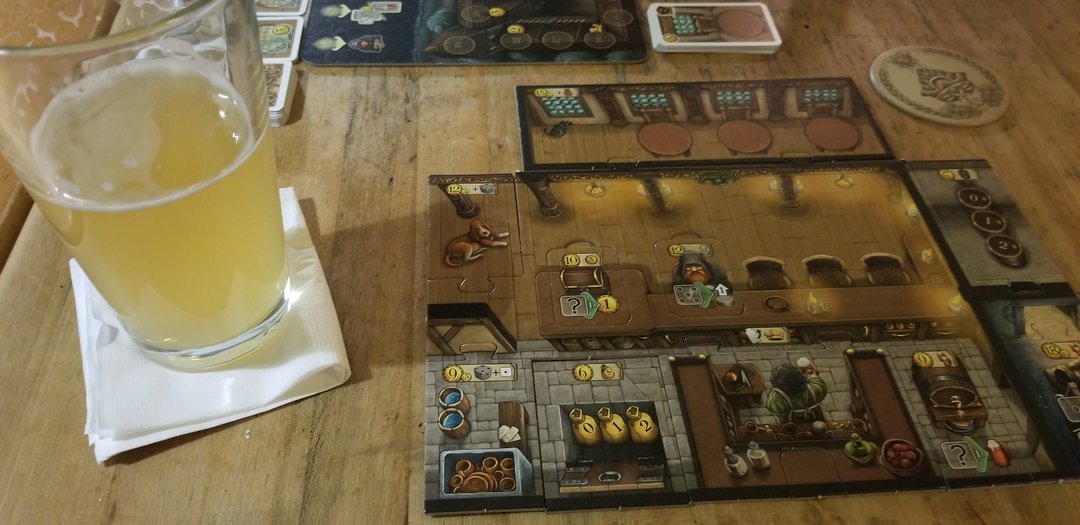
Everything is quiet and clean before the evening rush...
Of course no game is for every gamer. I have a feeling by now if you’re enjoying what you’re seeing, you’ll be safe picking up a copy of this game, but as ever here are some considerations for which tavern-goers this game might best suit. For one, people who enjoy a bit of multiplayer solitaire will find a good time here. The only real interaction between players comes from the dice draft and occasionally if someone buys out all of one particular upgrade/staff (such as the bards in our first game with reputation). Generally you build your own little establishment and you get the enjoyment of seeing if it sinks or swims. If you’re expecting heavier player interaction and the cutthroat pace akin to something more like Food Chain Magnate, you might find the stained wooden halls of Taverns a bit dull.
Also, if your friends or family are the kind to balk at the idea of extra modules, forcing you to leave all that wonderful extra content in the box, I can’t really see this making a great purchase. The rulebook does make a point that board gamers with a little experience can safely incorporate the first two modules without hassle, so you could just pretend that’s how the base game is played and never tell anyone. But if you’re not going to crack into those extra aged barrels this game comes with, I’d suggest you’re probably better off looking for another engine builder that’s more stand-alone out of the box.
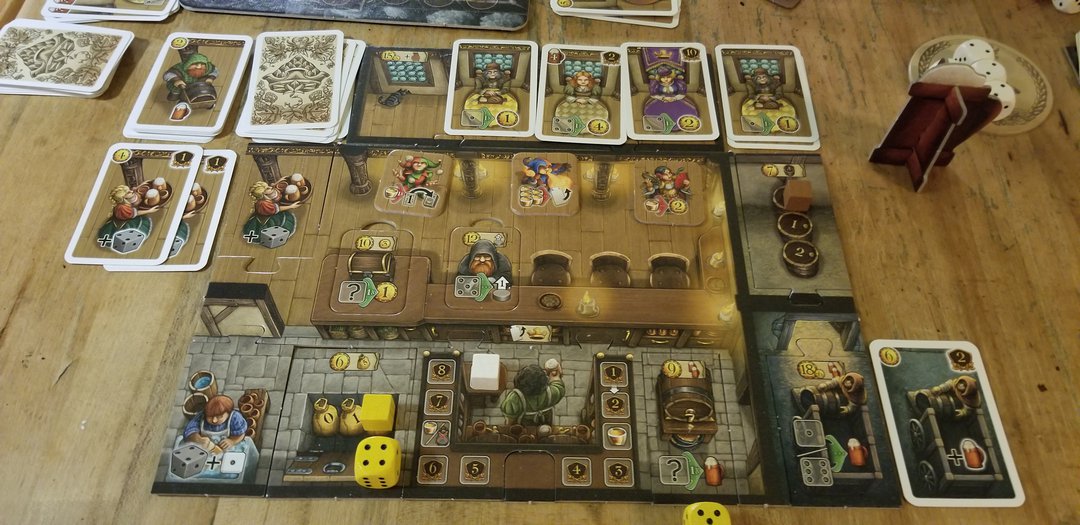
...but things quickly get lively when all the patrons and staff arrive!
Bang For Your Buck
There’s one more big plus going for Taverns that I haven’t mentioned. Something I’ve been mulling over that I feel makes this game a little extra special. It’s the bang for your buck you get. I talked about this briefly in my review of The Networks with The Executives expansion, another game that spans the range of gateway game to experienced gamer goodness. They’re both games capable of playing incredibly cleanly and simply for newer gamers, or for folks who like lighter games, while adding in extra depth and complexity for crowds that prefer their games crunchier. For the price of a single box here, what you get with The Taverns of Tiefenthal is quite the value. Coupled with its solid production quality, pleasingly modular boards, and a theme that brings those boards to life, I think the value on offer here is a steal.
If you don’t already own a game that runs this kind of range, or if you’re newer to the board gaming hobby, it’s hard to beat adding Taverns to your game shelves. I happen to prefer it to The Networks, also an excellently designed game, simply for the stronger theme and lesser direct player interaction (the former having less of the first and more of the second). If you’re an experienced gamer with shelves full of other strategy picks, I also still think Taverns is worth a look. There’s just something relaxing about playing it, even as you race to accrue points faster than your competitors. It’s pleasing to play, calm and enjoyable in the puzzle it proffers, and cozy in its presentation. By now you should have a sense of whether this business venture is for you, so if you do choose to open up your own tavern I wish you the best of luck. If you take the plunge here, I’m sure you’ll find good times ahead!